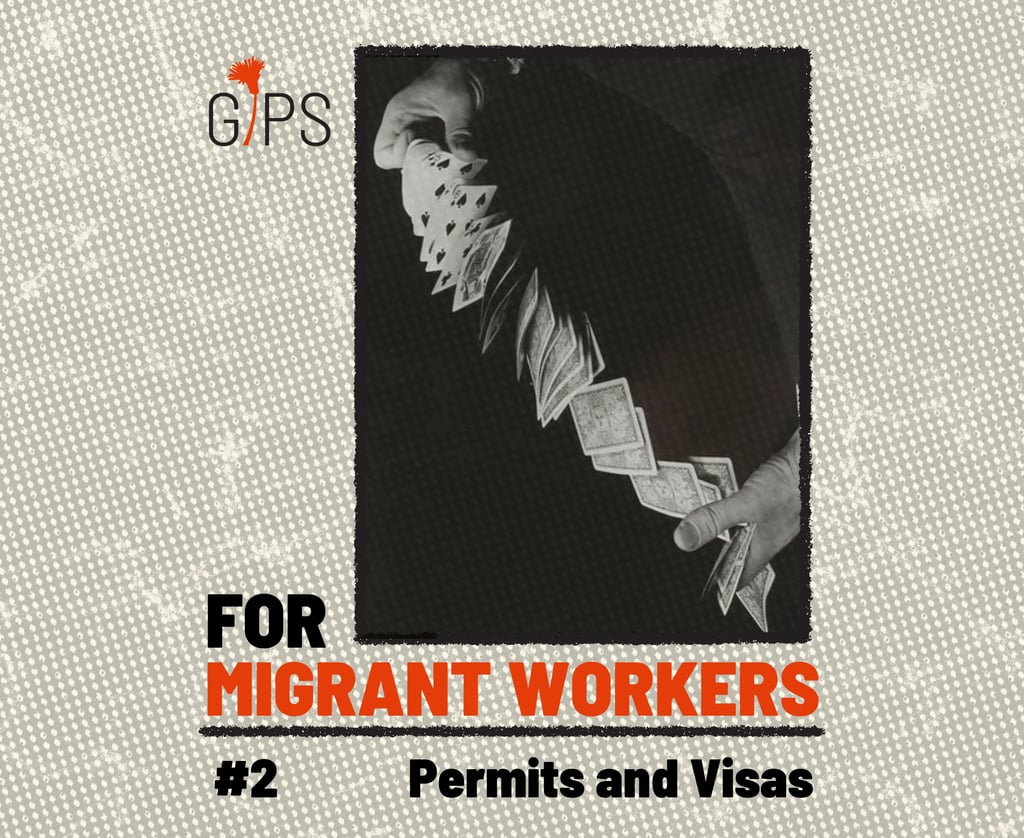G1PS FOR MIGRANT WORKERS 2# Permits and Visas
This guide breaks down the different permits for workers: from temporary and permanent residence permits to EU Blue Cards and national (D) visas.
G1PSENGLISH
7/9/20255 min read
Employers who exploit migrant workers rely on fear and confusion to keep people silent. They underpay, force unpaid overtime, make workers pay for their own safety gear—and when someone speaks up, they threaten deportation. This exploitation is widespread and made easier by many factors: language barriers, legal loopholes, and especially confusion about visas and permits. That confusion benefits employers, because understanding how the system works is crucial to defending yourself. This guide breaks down the different permits for workers: from temporary and permanent residence permits to EU Blue Cards and national (D) visas.
Seasonal workers are especially vulnerable, as they often come on short-term permits, work in physically demanding jobs, and face language barriers. Their employment is usually arranged by intermediaries, making accountability even more blurry. The seasonal work permit from the Employment Service (UŽT) in Lithuania allows a non-EU citizen to work for up to 6 months within a 12-month period. Once you obtain this permit, to legally enter Lithuania, you must also apply for a visa:
If your work period is 90 days or less, a Schengen visa is sufficient.
If it is longer than 90 days (up to 6 months), you need a national (D) visa, which is issued for the same duration as the permit
A national (D) visa is valid for up to 12 months. However, you cannot immediately obtain another one once it expires. You must wait at least 180 days after the end of your previous D‑visa before being issued a new one. So while the visa can cover a stay of up to 12 months, your right to work under a seasonal permit remains limited to 6 months per year. After leaving Lithuania, you must wait six months before returning on another D visa tied to seasonal work. If you want to stay and work longer than six months, you need to apply for a temporary residence permit based on employment.
Temporary residence permits (“leidimas laikinai gyventi”), which are often shortened as TRP, are issued to foreign nationals other than EU citizens. They are generally issued for the period of the job contract, but not longer than two years. A temporary residence permit may be issued for:
Work purposes
Family reunification
Business activities
Study purposes
Lithuanian origins and other special cases.
Processing time and fee: standard – 4 months, €160; urgent – 2 months, €320.
Changing employer / job function with the same employer – €100 fee.
It’s common knowledge that temporary residence permits tied to workplaces are very problematic. Employers gain an inadequate amount of power over the employees. You cannot change your employer unless:
you meet the same qualification requirements for the new job as for the original one (e.g. moving from one logistics company to another in the same role),
or you receive permission from the Migration Department under exceptional circumstances (e.g. your employer goes bankrupt, violates labor laws, or you file a labor dispute and win). After six months, you can change employers, but must follow a specific procedure (see the link below for more information).
Other important things to know about TRPs:
Application must be made from your country of origin: If you're applying for a TRP based on employment through an external service provider (such as a recruitment agency), the application must be submitted from your home country. For example, Sri Lankan citizens can no longer apply from Turkey, as was previously possible.
If you came to study and plan to quit – be careful: Many people arrive in Lithuania on a TRP issued for study purposes and then take up work. If you drop out of your studies, your permit will be cancelled, even if you are working legally. If you're planning to stop studying and continue working, you must apply for a new TRP based on employment. Don’t wait until your current permit is revoked.
Appealing a permit cancellation doesn't automatically protect you: If the Migration Department cancels your TRP and you appeal the decision in court, the cancellation is not automatically suspended. This means you might be legally required to leave Lithuania while your case is still pending.
Issued for 5 years, with the possibility of renewal, to a foreign national who:
Has continuously lived in Lithuania for 5 years while holding a temporary residence permit
Refugees or beneficiaries of subsidiary protection
Comes to Lithuania to live with a family member who is a Lithuanian citizen
Is entitled to reinstatement of Lithuanian citizenship and other special cases.
Processing time and fee: standard – 4 months, €160; urgent – 2 months, €320. Free for refugees.
It’s a type of a TRP specifically designed for highly-qualified non-EU citizens. There are two options:
1. Occupation included in the list of high value-added occupations and with a monthly salary of at least 1.2 times the monthly average gross wage;
2. Occupation that is NOT included in the list of high value-added occupations, with a monthly salary that is at least equal to 1.5 times the monthly average gross wage.
Valid for up to 3 years and can be extended for a further 3 years.
Enables you to apply for permanent residence after 5 years.
Allows you to bring your family with you.
Issued in 1 month under the standard procedure or 15 days under the expedited procedure
A foreign national holding a national (D) visa may come to Lithuania and stay for up to 12 months. This visa is issued for:
Seasonal workers with a permit from the Employment Service to work for more than 90 days;
Exchange students;
Visiting professors and researchers;
Professional athletes;
Seafarers;
Journalists accredited by the Ministry of Foreign Affairs;
Businesspeople invested in new Lithuanian companies;
People arriving under international agreements, or for other long-term purposes (e.g. medical treatment, rehabilitation, high-level training, or volunteering).
Not eligible for a (D) visa anymore: full-time students, lecturers or researchers under university employment contracts, workers in shortage occupations. These groups must apply for a temporary residence permit instead.
Processing Period: A visa should be issued within 15 calendar days, but sometimes takes up to 2 months.
YOU HAVE THE RIGHT TO REPORT ABUSE
Doesn’t matter if you’re here on a visa or residence permit tied to your job, you have rights under Lithuanian labour law. You have the right to report all violations, such as:
Not being paid or underpaid
Working overtime without pay
Unsafe working conditions
Verbal, physical or sexual abuse
Being forced to work outside the contract and so on.
You cannot be legally fired or deported just for asking for your rights. Employers who threaten you for this are the ones violating the law. If you feel unsafe, contact:
Labour Inspectorate (VDI) – for reporting unsafe or exploitative working conditions
Trade unions or migrant support organizations – for help, protection, and guidance through the system
Labour Disputes Commission (DGK) – for recovering unpaid wages or contract violations
Even if your permit is tied to your employer, reporting abuse is not a reason for deportation. In fact, if you win your case, it can help you switch employers or extend your permit.
There are many more aspects to migration law that are impossible to fit in one article. If you have any additional questions regarding permits or labour law, contact us by konsultacijos@g1ps.lt.



